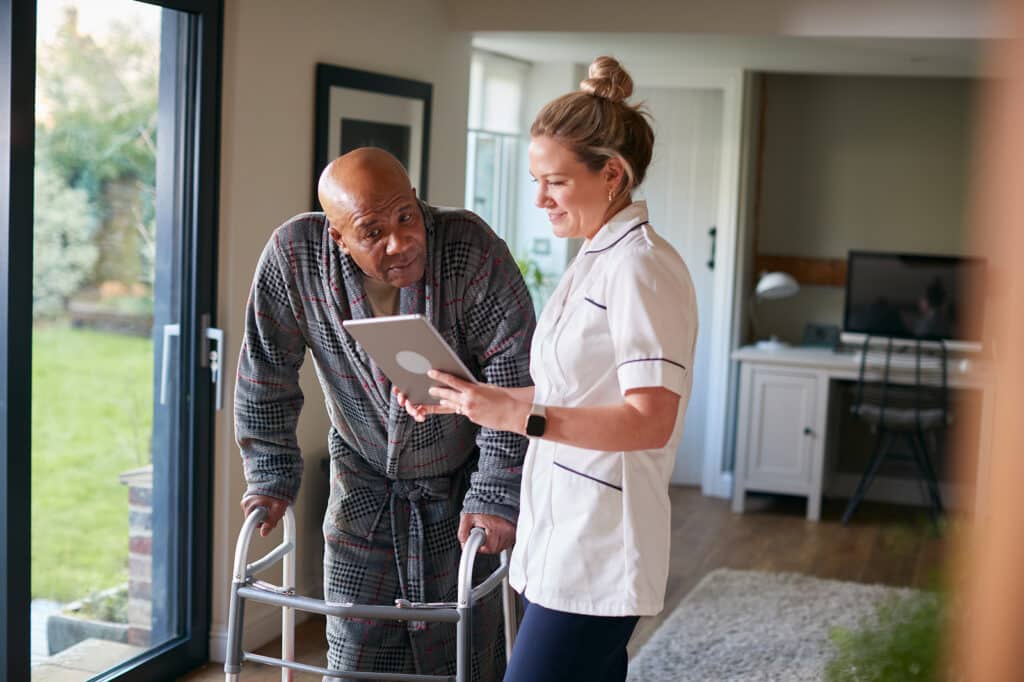As we age, maintaining independence and a high quality of life becomes increasingly important. For many seniors, staying in their own homes, surrounded by familiar comforts, is a key aspect of their well-being. Aimplus Seniors home care services offer a vital solution, providing the necessary support and care while allowing seniors to live independently.
Enhancing Quality of Life for Our Loved Ones
Senior home care encompasses a range of services designed to support older adults in their daily lives. These services can be tailored to meet the individual needs of seniors, ensuring they receive the right level of assistance.
Home care services typically include:
- Personal Care: Assistance with activities of daily living (ADLs) such as bathing, dressing, grooming, and toileting.
- Companion Care: Providing companionship, engaging in conversations, and accompanying seniors to social activities or appointments.
- Household Assistance: Help with household tasks like cooking, cleaning, laundry, and shopping.
- Medical Care: Skilled nursing care, medication management, and monitoring of health conditions.
- Therapy Services: Physical, occupational, and speech therapy provided at home.

Benefits of Senior Home Care
As our loved ones age, ensuring their well-being and quality of life becomes a top priority. Senior home care services offer a compassionate and effective solution, allowing older adults to receive the support they need in the comfort of their own homes. Here are some key benefits of senior home care:
Comfort and Familiarity
- Staying at Home: One of the most significant advantages is that seniors can remain in their familiar surroundings. This familiarity can provide a great sense of security and comfort, which is especially important for those with memory issues like dementia.
- Personal Belongings: Being surrounded by their own furniture, photographs, and mementos can help seniors feel more at ease.
Personalized Care
- Tailored Services: Home care services can be customized to meet the unique needs of each individual. Whether it’s help with daily activities, medical care, or companionship, the care plan is designed specifically for them.
- One-on-One Attention: Unlike in-care facilities, home care allows for one-on-one attention from caregivers, ensuring that seniors receive dedicated and focused care.
Independence and Autonomy
- Maintaining Routines: Home care enables seniors to maintain their daily routines and lifestyle, which can significantly enhance their sense of independence and self-worth.
- Choice and Control: Seniors have more control over their schedule and environment, including when they eat, sleep, and engage in activities.
Family Involvement
- Proximity and Involvement: Family members can stay close and actively participate in their loved one’s care, fostering stronger relationships and providing peace of mind.
- Flexible Visiting: Family members can visit more freely, as there are no set visiting hours as in many care facilities.
Improved Quality of Life
- Physical Health: Personalized care plans that include physical activities and proper nutrition can help maintain and improve a senior’s health.
- Mental and Emotional Well-Being: Regular interaction with caregivers and family members can reduce the feeling of loneliness and depression, enhancing emotional well-being.
Cost-Effectiveness
- Affordability: Home care can be more cost-effective than residential care facilities, especially when only part-time assistance is required.
- Flexibility: Services can be scaled up or down based on the senior’s changing needs, providing financial flexibility.
Safety and Security
- Reduced Risk of Infections: Staying at home minimizes exposure to infections and illnesses that can spread in communal living environments.
- Personalized Attention: Caregivers can identify and address potential safety hazards in the home, reducing the risk of accidents and falls.
Companionship and Social Interaction
- Building Relationships: Caregivers often become trusted companions, providing social interaction and friendship that can significantly enhance a senior’s quality of life.
- Encouraging Activities: Caregivers can encourage and participate in social activities, hobbies, and outings, helping seniors stay active and engaged.
Peace of Mind for Families
- Professional Care: Knowing that a professional is providing care can give family members peace of mind, reducing their stress and allowing them to focus on their relationship with their loved one.
- Emergency Response: Caregivers are trained to respond to emergencies and can ensure timely medical intervention if needed.
Access to Skilled Care
- Medical Support: Home care can include skilled nursing services, such as wound care, medication management, and monitoring of health conditions.
- Rehabilitation Services: Physical, occupational, and speech therapy can be provided at home, facilitating recovery and improving overall health.




